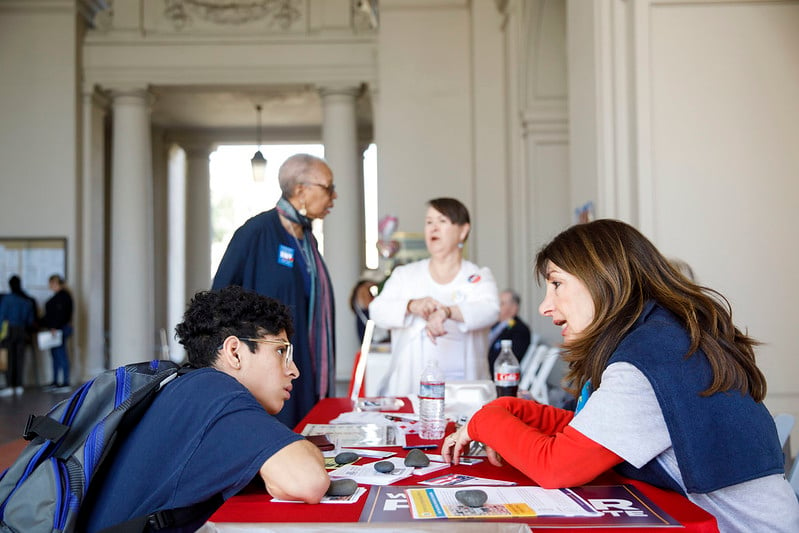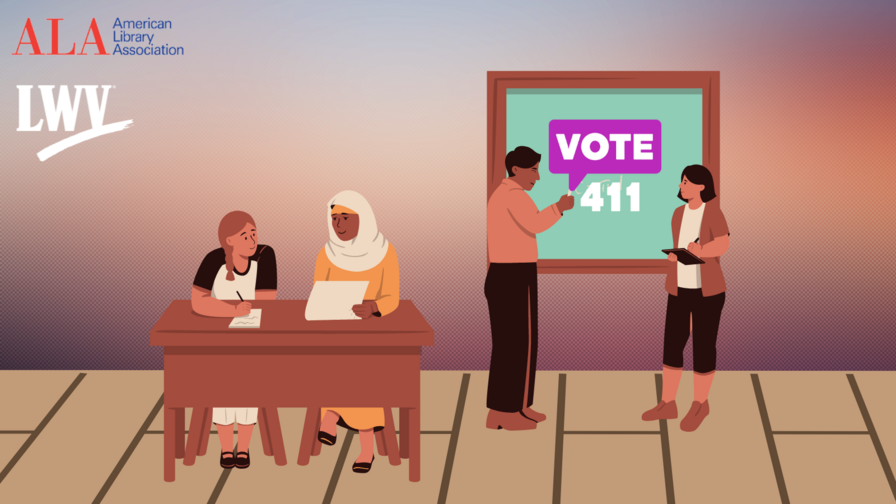Leagues, Libraries, and Informing Voters
Originally published in June 2024
Public libraries have a long history of cultivating strong civic communities. There are roughly 9,000 public libraries across the country. These critical institutions offer public spaces for community members to access trusted information and engage in discourse that bridges political divides. Libraries are a powerful resource for promoting knowledge, learning, and community.
Yet this kind of access is increasingly limited and, in some places, under attack. In 2024, the American Library Association tracked 821 attempts to censor library materials and services. Meanwhile, from 2021-2025, PEN America documented nearly 16,000 book bans in public schools. This aligns with a broader trend in the US of attacks on access to information and attempts to limit full participation in the democratic process, starting with education.
Stay Updated
Keep up with news on elections, misinformation, and more. Receive emails to your inbox!
Access to free, trusted, and unrestricted information is essential to empowering an informed and engaged electorate. Elections at the federal, state, and local levels directly affect the communities that libraries serve and the issues their users care about. Access to nonpartisan civic information that breaks down the barriers to ballot casting is critical to ensuring all Americans can engage in the democratic process. That’s where the League of Women Voters comes in.
The League of Women Voters is a nonpartisan civic organization that has worked since 1920 to empower voters and defend democracy. This work is done primarily on the ground, led by volunteer community members in 700+ local Leagues in every state and DC. These Leagues host voter registration drives, publish detailed voter guides, host civics education seminars, help communities navigate the new landscape of mis and disinformation, and get involved in virtually every part of the civic engagement process.
Libraries and Leagues are two of the few lasting, nonpartisan civic entities with the community ties and trust to encourage civic dialogue based on issues their community cares about. They have a long history of working together to inform and empower voters.

That work — and collaboration — is more important than ever. That's why the American Library Association and the League of Women Voters partnered in 2024 to support local Leagues and libraries in increasing access to nonpartisan civic information and resources. Our joint toolkit offered guidance, resources, and local case studies to supplement and expand upon the essential work on the ground, much of which is still relevant.
Guidance for Libraries
Libraries looking to encourage civic participation can do so in many ways:
Reach out to your local League
This League locator offers an easy way to find contact information for your local League. With shifting laws and confusing processes around voter registration and engagement, partnering with League of Women Voters will ensure you have the expertise and capacity to execute strategic civic programming.
Utilize VOTE411.org
This includes a voter registration tool, state-based information on upcoming election deadlines and rules, and a detailed, ZIP-code-specific ballot guide that offers information on candidates and issues down to the local level on upcoming elections. Available in both English and Spanish, this site is populated by League staff and volunteers across the country and is kept up to date in real-time as shifts occur. Getting this information into the hands of library patrons to help serve their individual needs is an important task.
Host voter registration drives and/or civics events in partnership with Leagues.
Leagues and libraries have hosted creative and engaging civic events for decades, such as local candidate forums, voter registration drives, mis- and disinformation identification trainings, and Civics 101 courses. Providing in-person space for public discourse, questions, and conversation based on locally relevant issues is an essential service.
Leagues and libraries know that knowledge is power. That’s why we’re working to ensure everyone has access to civic information. Get involved in your community by reaching out to join or partner with your local League today.
The Latest from the League
WASHINGTON — The American Library Association (ALA) and League of Women Voters today announced a new partnership to educate and empower voters in 2024. The collaboration is part of ALA’s recently launched Reader. Voter. Ready. campaign aimed to equip libraries to engage with voters.
Civic education and involvement are key to a healthy American democracy. Included are stories from states across the country about the importance of civic engagement and the work that they are doing to promote it.
This blog highlights work in Florida, Maine, Maryland, Minnesota, and Pennsylvania.
Sign Up For Email
Keep up with the League. Receive emails to your inbox!
Donate to support our work
to empower voters and defend democracy.





